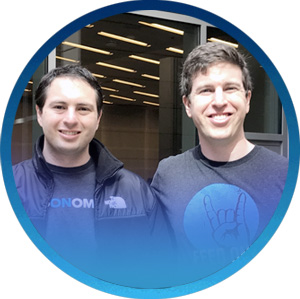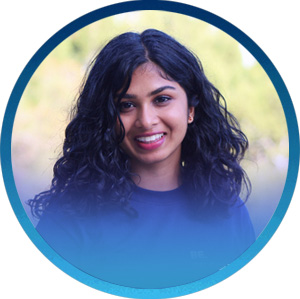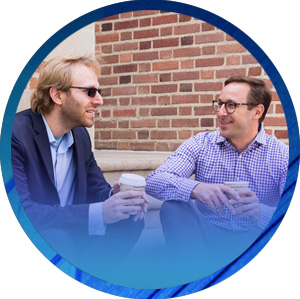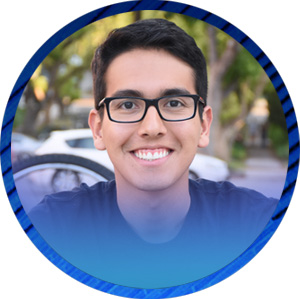
Samueli Startups: Engineering Entrepreneurship

Brian and Robert Roizen
Brian Roizen ’10, MS ’11 and brother, Robert ’13, consider themselves problem solvers. That problem-solving drive motivated the Roizen brothers to create Feedonomics, a product feed optimization platform that serves some of the largest retailers, including giants like Amazon, Walmart, and Google, to analyze how to best present content on ecommerce websites.
After graduating UCLA Samueli, Brian and Robert first put their engineering skills to the test in by working at an ad agency. “We brought a whole new level of math and science into marketing for ecommerce stores,” Brian Roizen said.
While at the agency, Brian and Robert got introduced to product feeds, which include data on everything from the title of the product to how many are left in stock. When it came to managing data for large clients who sold millions of products, the Roizen brothers found that existing systems were slow at processing large amounts of product data.
Viewing this as the perfect opportunity to create value, the brothers created Feedonomics to optimize product data and make sure the data matches the way users search for products, thereby improving product relevancy on search engines.
Brian says one of the most productive classes he took at UCLA was CS 31 with senior lecturer Smallberg. “That was the turning point. Once we were able to make things dynamic with C++, it was kind of amazing. We could update all 10,000 pages in 10 seconds, and that was the power of those first few core CS classes we took.”
Feedonomics started three and a half years ago and has now grown to 80 employees—over half of which are Bruins. Brian and Robert’s father, Igor Roizen MS ’83, also plays an integral role in the company. A Samueli grad himself, Igor worked with Professor Judea Pearl to develop pioneering artificial intelligence algorithms.
Brian shared that one thing that is unique to Feedonomics is its culture, which derives many of its principles from legendary UCLA men’s basketball coach John Wooden, such as leading by example. “We have this truly remarkable collaborative and friendly culture that I haven’t seen anywhere since I was at UCLA.”

Anita Ilango
Raised in Cupertino, Calif., famously known as the headquarters of Apple Inc., second-year computer science student Anita Ilango (exp. ’21) is no stranger to startups.
The summer after she graduated high school, Anita started interning at Waterline Data, a data science startup. She made her hour-long commute enjoyable by listening to entrepreneurship podcasts; a favorite that honed her interest in entrepreneurship is ‘Masters of Scale’ by Reid Hoffman, co-founder of LinkedIn.
“The podcast exposed me to the experiences and advice of successful startup founders in topics like leadership, raising funding, releasing an imperfect product, and focusing on the individual customer.”
Once at UCLA, hungry for more hands-on experience, Anita actively sought out entrepreneurship-focused groups to join. She started out as an analyst at Bruin Ventures where she performed a case analysis on a social tech startup, researching areas such as funding, competitors, and predicted performance.
She also carved out time to serve as a board member for Bruin Entrepreneurs, and joined the group’s student-run startup accelerator, Startup Labs, to contribute to its curriculum team.
“Joining the curriculum team at Startup Labs gave me the opportunity to further learn about the startup process and help present that information to fellow students in the accelerator.”
This fall, Anita will serve as director of Startup Labs and hone the organization’s focus on bringing in a more diverse, cross-disciplinary set of students. Her plans also include expanding the existing program into a more integrated, mentor-focused experience.
Her advice to fellow students who are thinking of diving into the startup world?
“Stay curious and get to know other entrepreneurially minded students. Learning from peers and the world around you is extremely helpful in developing an entrepreneurial mindset.”

Westbrook Weaver
Tempo Therapeutics, co-founded by Westbrook Weaver MS ’11, PhD ’13, Don Griffin PhD ’11, Bioengineering Professor Dino Di Carlo, and UCLA Medical Center dermatologist Dr. Philip Scumpia, recently patented an injectable hydrogel that helps skin wounds heal more quickly.
This is one of five biotech companies Professor Di Carlo has helped launch based on research performed at UCLA Samueli.
Commenting on the entrepreneurial spirit at Samueli, Westbrook shared, “Professor Di Carlo is very entrepreneurial in general. He constantly asks, ‘What can we develop that can go into the clinic and be used by a person?’ There’s a commitment to entrepreneurship that I was definitely able to pull from.”
The proximity of UCLA Samueli to the UCLA Geffen School of Medicine and UCLA Anderson School of Management have produced numerous natural cross-disciplinary partnerships.
“I ended up taking a class at UCLA Anderson, and I began to learn the difference between a research project and a business venture, and I was able to make valuable connections with professors at Anderson.”
While at Samueli, Westbrook also easily connected with fellow researcher Don Griffin, who directs the scientific operations of Tempo.
“I actually met Don on UCLA’s bioengineering intramural soccer team. He worked in a lab down the hall. He did tissue engineering, I did microfluidics—two subsets of bioengineering that don’t normally talk to one another. The two skill sets came together to create the technology that our company is founded on.”
Achieving a biomaterial that promotes rapid regeneration while maintaining structural support has been a holy grail in the field of tissue engineering, and Tempo Therapeutics has achieved this.
“At UCLA Samueli you have the world of research at your fingertips. The labs are right there. Often all you have to do is send someone an email and you can go work there to do cutting-edge research.”

Alejandro Rioja
A native of Bolivia, recent graduate Alejandro Rioja ’17 is busy growing Flux Ventures, an ever-evolving conglomerate of companies that has flourished since the initial success of Flux Chargers, his first entrepreneurial venture at UCLA Samueli.
Alejandro co-founded Flux Chargers, a portable charger that has been sold in 91 countries, with fellow UCLA grad Miles Anthony ’17, and credits Bruin Plate, the residential dining hall, for bringing them together. “Bruin Plate is a favorite memory, not just because of the amazing Moroccan salmon or soy-glazed tempeh but because it has been the single most useful resource to meet new friends.”
Flux Ventures was part of the Startup UCLA accelerator in 2015, which helped pave the way for Alejandro’s future entrepreneurial plans.
He recently launched a startup incubator in Bolivia called 6BLabs.com to help foster technological innovations. The incubator focuses on financial technology, blockchain, Software as a Service, e-commerce and mobile apps.
“I started 6BLabs because I wanted to provide an opportunity for the many bright and talented Bolivians who may need a little guidance, funding or connections to make their ideas happen. Anyone, regardless of whether or not they are Bolivians, can apply to participate in the incubator.”
As a teenager, Alejandro dreamed of starting his own company after being inspired by the likes of Steve Jobs, Elon Musk and Richard Branson.
“That dream chased me for many years until I decided to take action and come to the U.S. to pursue my education,” he said. “During my four years of undergrad at Samueli, I tried to consume as much information as possible about business, psychology, marketing, and computer science.”
“In the last four years, I met smart and unique people that made my college experience so much more fulfilling and special. From classmates that became long-term friends to the alumni and faculty that helped push my projects forward, it was quite a ride.”
